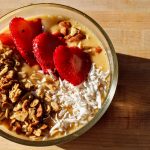Best Diet For Weight Loss
When it comes to weight loss or gain, the equation is relatively straightforward: you lose weight when your energy output surpasses that of what you consume and vice versa. The calories we intake versus those burned dictate whether our waistline shrinks or expands.
To shed those unwanted pounds, experts recommend following a healthy calorie budget and burning the required number of calories for optimal results. A combination of both diet and exercise can help you reach your goals quickly!

One of the most important factors we need to consider when trying to lose weight is the type of diet we follow. Eating healthy foods like fruits, vegetables, and lean proteins can be a great way to lose weight without starving your body.
Here’s a take on how an ideal diet should look like:
A balanced, healthy weight loss diet is essential for healthy weight loss. Without the proper nutrients, your body can’t function properly and will be unable to burn fat efficiently. And while you might think that cutting carbs or eliminating certain food groups is the key to losing weight, all of these methods are counterproductive because they deprive your body of much-needed energy.
So what are the best foods to eat if you’re trying to lose weight?
-
Whole Grains
-
Lean proteins
-
Fruits & Vegetables
-
Healthy Fats
The answer is simple: focus on getting in plenty of whole grains, lean proteins, fruits and vegetables, and healthy fats. These are all essential components of a well-balanced diet that will help your body function at its very best.
Whole grains are an excellent source of energy and contain plenty of fiber, which helps keep you feeling full for longer. Pair your whole grains with lean protein for a filling meal that will help you maintain or even lose weight.
And don’t forget those fruits and veggies! These foods provide essential vitamins and minerals that your body needs to function.
To get the most out of your diet, it’s also crucial to avoid processed foods, including fast food and frozen dinners. These foods may be convenient, but they are often high in unhealthy fats, sodium, and calories.
By focusing on whole, natural foods instead, you can ensure that you’re giving your body the energy and nutrients it needs to burn fat efficiently.
How To Choose The Best Diet?
There’s a lot of buzz right now about the best diet for weight loss. Here are some things to keep in mind as you consider the different options out there:
- All diets revolve around eating fewer calories than your body needs, so be sure to consult a doctor before starting any weight loss plan.
- some diets emphasize different kinds of foods: some focus on low-carbohydrate or low-fat options, while others focus on eating lots of protein. You’ll want to figure out what works best for you and your lifestyle.
- Some diets advocate counting calories, while others focus more on portion control. Again, figure out which approach will work best for you and your goals.
- One thing to keep in mind is that no single diet is guaranteed to work for everyone. If one diet doesn’t seem to be helping you lose weight after a month or two, don’t be afraid to try something different.
Boost Your Weight Loss
The best diet for weight loss is one that helps you create a calorie deficit. This means that you need to burn more calories than you consume to lose weight. Some of the most effective strategies for losing weight are:
- Increasing your physical activity. This can be done by exercising regularly, or by simply being more active throughout the day (taking the stairs instead of the elevator, walking around while on the phone, etc.)
- Cutting back on junk food and processed snacks. 99% of the things that comes processed and packed.
- Reducing portion sizes. Trick your mind into eating less by replacing your regular plates with smaller plates instead.
- Getting enough sleep. Think 8 hours.
- Drinking plenty of water. Yup! Stay hydrated at all times.
Bottom-line
When it comes to losing weight and keeping it off, the best diet is the one that works for you!
We mostly begin our weight loss journey on a high roll but eventually hit a plateau where the internal and external pressures to lose weight start fading. During this phase, it is important that we remain focused on our goals and don’t get swayed off track by our urges and hungry feelings.
Staying hydrated is crucial for weight loss since dehydration can lead to fatigue, reduced energy levels, and even overeating. So make sure that you’re getting in plenty of fluids at regular intervals throughout the day. Another important aspect is exercise – combining both cardio and strength training workouts will help you shed those extra pounds faster.
Good luck on your journey toward a healthier lifestyle.



